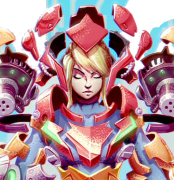|
Yond Cassius posted:It's not about Tom Kirby specifically, but someone on /r/hobbydrama wrote up a pretty good summary of the Sigmar debacle. That is a pretty good writeup. As you said, it doesn't really cover the absurd, sometimes corrupt, and weirdly hostile tenure of Tom Kirby. Highlights of the first death thread included Kirby's very inappropriate, bloviating prefaces to the company's financial reports. GW's treatment of its retail employees was also completely insane.
|
|
|
|

|
| # ? May 26, 2024 23:25 |
|
theironjef posted:See, this is why I used the qualifier "I think." I pretty much discounted GNS immediately on looking at it as an obscuring mechanism designed to give assholes the tools to call whatever game they liked the good one and any other games the bad one. I honestly don't even remember which one the good one was. It was N. The language for the others was intentionally dismissive. It was an interesting idea from a perspective of "you cannot and should not design a game for everyone, so figure out what you want to emphasize and prioritize that in design decisions" but the actual use was, as you said, a way to label games as bad and shove everything into one corner of the triangle. Add in an intentional evangelical component where folks would go to other forums and scream loudly about GNS picking fights, and the idea's just cursed now. If I recall that evangelical wave was pre-4e, but then the 4e haters tried to start it up again as an excuse to dump on 4e.
|
|
|
|
Bruceski posted:It was N. The language for the others was intentionally dismissive. Gobbeldygook fucked around with this message at 22:55 on Nov 29, 2020 |
|
|
|
Bruceski posted:It was N. The language for the others was intentionally dismissive. Robin Laws's book of GM advice developed the idea in a much better way. And yeah, there were people who would crash into every discussion about a game with a rant about how it was a Simulationist or Gamist design and not fit you carry the jockstrap of a proper Narrativist game.
|
|
|
|
Gobbeldygook posted:Ron Edwards is Osama Bin Laden and the Forge is his mountain terrorist training ground. Every so often his acolytes run out to other forums with 20,000 word essays about the meaning of Buttsex strapped to their chest. On the other hand the Forge gave us PARANOIA XP so all crimes are forgiven by The Computer for that perfect work.
|
|
|
|
FMguru posted:Yeah, there was an excellent core idea at the heart of GNS theory (that there is no one way to play RPGs and different players will look for different things from their games) but they lost me when they kept insisting that there were EXACTLY THREE approaches to designing an RPG (no more, no less) and that their preferred way (always 'N') was superior/more advanced/more adult than the other two. Robin's Laws took its initial list of player archetypes from Glen Blacow's Aspects of Adventure Gaming, which far predates GNS and GDS, and had only four aspects: Power Gamer, Role-Player, Wargamer, and Storyteller. GNS essentially just consolidates Power Gamer and Wargamer into a single category in terms of what's provided by system design, but the terms it uses are generally horrible. "Simulationist" is misconstrued time and time again. Edwards changed Dramatist to Narrativist because the original term was used to mean "a satisfying storyline", but neither has managed to escape the assumption that "story" means something written before the session and thus the term means railroading. (And don't get me started on how Edwards mangled "story now".) I'm not sure that Narrativism was pushed that heavily by Edwards himself - I think only one of his games, a lesser known one (Trollbabe) ever claimed to be 100% Narrativist. Rather, he had a bee in his bonnet about it because of Vampire.
|
|
|
|
hyphz posted:Robin's Laws took its initial list of player archetypes from Glen Blacow's Aspects of Adventure Gaming, which far predates GNS and GDS, and had only four aspects: Power Gamer, Role-Player, Wargamer, and Storyteller. Which reminds me of the ancient Usenet classic about Real Men, Real Roleplayers, Loonies, and Munchkins.
|
|
|
|
hyphz posted:Robin's Laws took its initial list of player archetypes from Glen Blacow's Aspects of Adventure Gaming, which far predates GNS and GDS, and had only four aspects: Power Gamer, Role-Player, Wargamer, and Storyteller. GNS essentially just consolidates Power Gamer and Wargamer into a single category in terms of what's provided by system design, but the terms it uses are generally horrible. "Simulationist" is misconstrued time and time again. Edwards changed Dramatist to Narrativist because the original term was used to mean "a satisfying storyline", but neither has managed to escape the assumption that "story" means something written before the session and thus the term means railroading. (And don't get me started on how Edwards mangled "story now".) I feel like the conceit behind GNS is also a little different than those lists of player archetypes that showed up in Robin's Laws and other GM advice books of the time, since the player archetypes were more about what individual players enjoyed about the RPG experience, while GNS was more about how players/GM's viewed the rules they were interacting with. I think GNS is an overly simplified concept, but I think there's at least a kernel of a legitimate observation it's built off of. Every game is going to use some combination of the three ideas in its ruleset, and I feel like the major divide comes more from the players rather than the designers. There's always been this contingent of people who think D&D should be a realistic physics simulator, which the game has absolutely never been.
|
|
|
|
My hot take has always been that Ron Edwards was being Richard Bartle, and we don't have a Nick Yee yet.
|
|
|
|
Leperflesh posted:That is a pretty good writeup. As you said, it doesn't really cover the absurd, sometimes corrupt, and weirdly hostile tenure of Tom Kirby. Highlights of the first death thread included Kirby's very inappropriate, bloviating prefaces to the company's financial reports. GW's treatment of its retail employees was also completely insane. Was Kirby the one who thought that the Warhammer video games were a direct competitor to Games Workshop?
|
|
|
|
KingKalamari posted:I think GNS is an overly simplified concept http://www.indie-rpgs.com/_articles/narr_essay.html posted:System - "it does matter" all over again
|
|
|
|
Sorry, I should clarify: GNS Theory as it was understood by angry people on the internet is an overly simplified concept.
|
|
|
|
senrath posted:Was Kirby the one who thought that the Warhammer video games were a direct competitor to Games Workshop? He was dismissive of computer games in general, but also I think he was in charge when Warhammer: Total War was licensed so I get the impression his attitude wasn't overriding. The has company consistently refused to allow a computer game to implement the rules from 40k or Warhammer, I think because of the fear of competing with the tabletop games, yeah. I don't think that's changed, and it's dumb. He also famously wrote "where is Pokemon now?" while pokemon licenses and revenue dwarfed GWs, lol.
|
|
|
|
KingKalamari posted:Sorry, I should clarify: GNS Theory as it was understood by angry people on the internet is an overly simplified concept.
|
|
|
|
Who knew so much of that narrativist poo poo is just arguing over whether an attack roll is a sword swing or the combined value/culmination of several seconds of cinematic fighting? That's more or less perfectly structured to create neverending fights, since a lot of games, like straight up ol' D&D, are rife with confusion on that point and the battleground for a ton of dumb arguments about it! Is GNS just dumbass Valhalla?
|
|
|
|
People huffing about Narrativism being better than Simulationism or (shudder) Gamism is just a jumped-up version of our old friend "roleplaying, not ROLL-playing!"
|
|
|
|
theironjef posted:Is GNS just dumbass Valhalla? Nah, dumbass Gehenna. More significantly, I think that part of the problem comes from it difficult to distinguish "a good story" from "an enjoyable experience with a story". hyphz fucked around with this message at 02:46 on Nov 30, 2020 |
|
|
|
Tom Kirby was a collosal moron and I have no idea how he lasted 30 years
|
|
|
|
Nissin Cup Nudist posted:Tom Kirby was a collosal moron and I have no idea how he lasted 30 years Institutional inertia and the total incapacity of the investors to understand or care about the inadequacies of leadership at a toy company.
|
|
|
|
Nissin Cup Nudist posted:Tom Kirby was a collosal moron and I have no idea how he lasted 30 years Sometimes you just own a huge number of shares and there isn't much anyone can do about it. I know that is a large part of why Tony hasn't gotten the boot.
|
|
|
|
Lemniscate Blue posted:Which reminds me of the ancient Usenet classic about Real Men, Real Roleplayers, Loonies, and Munchkins. Man, I remember this stuff. In hindsight it was loving insufferable.
|
|
|
|
That meme is the only reason anyone remembers Spawn of Fashan.
|
|
|
|
ZeroCount posted:Man, I remember this stuff. In hindsight it was loving insufferable. Yeah, I was reading through it a bit and yikes. Oh well - the past is another country.
|
|
|
|
Bruceski posted:It was N. The language for the others was intentionally dismissive. This is not how I remember it. Or more accurately the message round G was "stop dumping on the people you call Rollplayers. What they do is actually pretty cool and should be thought of more". It came out of a 90s White Wolf mindset with screeds about "Roleplaying not Rollplaying" used as part of the game to justify lovely rules, and Ron Edwards was trying to rehabilitate G.
|
|
|
|
There's nothing wrong with being the guy who's just there to throw dice and win combats, as long as everyone else at the table is cool with that being a major part of the game. The whole roleplayer/rollplayer split has always been a problem of people not having a ten minute conversation about mutual expectations before sitting down to roll characters.
|
|
|
|
neonchameleon posted:This is not how I remember it.
|
|
|
|
Gobbeldygook posted:The biggest problem with discussing GNS is that everyone looks at the words "gamist/narrativist/simulationist", ignores the writings of the creator, and invents their own theory based on their definitions of the words. It would be like trying to discuss utilitarianism if half the people talking about it thought utilitarians believed only utility workers had rights. The second biggest is that Ron Edward's writing is worse than reading Lacan via Google Translate. To be fair, plenty of self-professed utilitarians don't actually interact with 'utility' as a term the way JS Mill or Bentham would have at all. This kind of thing is painfully inevitable with any term that isn't both unique and aggressively circumscribed by the creator, and is why jargon proliferates in specialized fields in my opinion. Why does science fiction studies need the term 'novum' instead of 'novelty?' Because 'novelty' might be construed different ways while 'novum' means you're talking about Suvin. Unless you're just using it secondhand and now it means two things, oh no, we need more terms! MORE TERMS! Language was a mistake.
|
|
|
|
Joe Slowboat posted:Why does science fiction studies need the term 'novum' instead of 'novelty?' Because 'novelty' might be construed different ways while 'novum' means you're talking about Suvin. Unless you're just using it secondhand and now it means two things, oh no, we need more terms! MORE TERMS! Take a -2 malus to all your rolls
|
|
|
|
theironjef posted:Who knew so much of that narrativist poo poo is just arguing over whether an attack roll is a sword swing or the combined value/culmination of several seconds of cinematic fighting? That's more or less perfectly structured to create neverending fights, since a lot of games, like straight up ol' D&D, are rife with confusion on that point and the battleground for a ton of dumb arguments about it! Is GNS just dumbass Valhalla? I mean, that essay isn't really arguing over anything, it's bringing up something to consider when designing a game (although granted, it does say that one approach works better in a particular style of game). How D&D treats task resolution is beside the point.
|
|
|
|
Liquid Communism posted:There's nothing wrong with being the guy who's just there to throw dice and win combats, as long as everyone else at the table is cool with that being a major part of the game. It's also yet another symptom of the weird elitism that pervades the hobby, where there's this contingent of people who act like being "good" at Dungeons and Dragons is an elite skill reserved only for a select few.
|
|
|
|
KingKalamari posted:I think GNS is an overly simplified concept, but I think there's at least a kernel of a legitimate observation it's built off of. Every game is going to use some combination of the three ideas in its ruleset, and I feel like the major divide comes more from the players rather than the designers. There's always been this contingent of people who think D&D should be a realistic physics simulator, which the game has absolutely never been. KingKalamari posted:Sorry, I should clarify: GNS Theory as it was understood by angry people on the internet is an overly simplified concept. Terrible Opinions posted:Funniest thing is how the people mad about "rollplayers" the loudest inevitably play incredibly rules heavy poorly balanced games like White Wolf, 3.5 D&D, or Pathfinder. Lordy the Paizo forums were a miasma. neonchameleon posted:Or more accurately the message round G was "stop dumping on the people you call Rollplayers. What they do is actually pretty cool and should be thought of more". It came out of a 90s White Wolf mindset with screeds about "Roleplaying not Rollplaying" used as part of the game to justify lovely rules, and Ron Edwards was trying to rehabilitate G.
|
|
|
|
Halloween Jack posted:Uh, was he? I wasn't hip-deep in the Forge and the communities and discussions that came out of it, but my impression was that Edwards was all about identifying and championing Narrativism. As I saw it, he was fine with Gamism as far is it worked, but he greatly encouraged Narrativism because he and others there saw it as a new thing at the time. Plus, it's way too easy to glom on to because it's too hard to distinguish "story", "plot", and "experience" in an RPG.
|
|
|
|
Halloween Jack posted:Yeah, Simulation didn't mean "the rules are the physics of the setting" in either the Threefold Model or GNS. But half of the discussion of RPG theory has been people misappropriating it to fight edition wars, and Simulation probably got it the worst! Yeah, as described Apocalypse World is a Simulation game because its trying to simulate a genre of media.
|
|
|
|
Does that mean things can retroactively become simulationist? Is Rifts simulationist now because Ready Player One(or Pixels whichever hit the toilet water first) started the "just smash all your nerd poo poo together badly" media genre?
|
|
|
|
theironjef posted:Does that mean things can retroactively become simulationist? Is Rifts simulationist now because Ready Player One started the "just smash all your nerd poo poo together badly" media genre? I'm not sure RPG rules produced via Cargo Cult count.
|
|
|
|
theironjef posted:Does that mean things can retroactively become simulationist? Is Rifts simulationist now because Ready Player One(or Pixels whichever hit the toilet water first) started the "just smash all your nerd poo poo together badly" media genre? I'm pretty sure that simulationist originally referred to "making decisions by the same method that your character would use to make them".
|
|
|
|
Halloween Jack posted:I have to admit, I grew up playing Shadowrun and White Wolf games, and it wasn't until I played D&D that I really learned how to look at game design (and specifically game balance) in a logical, disciplined way.
|
|
|
|
The weirdest thing about GNS is that people talk about it like Ron Edwards is out there pushing his "GNS Theory of RPG Game Design" course on Skillshare. He's living rent-free in ya'lls heads off of a few posts he wrote in 2001 on a forum that closed in 2012.
|
|
|
|
admanb posted:The weirdest thing about GNS is that people talk about it like Ron Edwards is out there pushing his "GNS Theory of RPG Game Design" course on Skillshare. He's living rent-free in ya'lls heads off of a few posts he wrote in 2001 on a forum that closed in 2012. He does still actually run seminars and design consultancy. https://adeptplay.com/
|
|
|
|

|
| # ? May 26, 2024 23:25 |
|
I've never really believed GNS is a helpful framework at all since every RPG partakes of all three letters and if you really dig down I don't even think that you can legibly argue that a particular game even uses one more than the other two. Like, is D&D simulating a fantasy world or providing a tactical challenge? Is the blood point economy in Vampire there to produce a particular type of story, illustrate how vampires "really" work (in this setting), or face players with an interesting optimization problem? Even in games whose mechanics partially or completely cover OOC story editing stuff rather than anything that's real to the characters themselves, you're still simulating something and - whether you want to or not - posing the people engaged in that simulation with a strategic game to play at the same time.
|
|
|

































